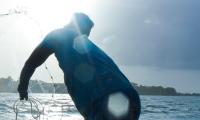Improving the human rights situation of indigenous Miskito divers in Honduras

In the coastal province of Gracias a Dios in Honduras, dive fishing of lobster, sea cucumbers and snails has developed as an important occupation for the indigenous Miskito population. Artisanal lobster fishing was traditionally part of the Miskito livelihood, and the free-diving capacity of the indigenous fishers was exploited in the rapid commercialisation of the industry. Lobster diving is the main source of employment in the region, including very young men, and lobster is an important export commodity in Honduras.
However, the indigenous Miskito divers face numerous human and labour rights violations in the fisheries sector, with many suffering from decompression sickness due to inadequate safety measures.
Recently, a Miskito diver became seriously injured. To ensure that he received proper medical care and that his labour rights were respected, the Honduran National Human Rights Institution (CONADEH) stepped in. The case exemplifies the ongoing efforts by CONADEH and the Danish Institute for Human Rights to address such challenges.
To document and tackle the human rights issues faced by the Miskito divers, CONADEH and the Danish Institute for Human Rights have carried out a sector-wide impact assessment of the industrial fishing sector in Honduras. The assessment aims to document the human rights impacts inflicted on the divers and engage industry and government actors in developing recommendations and joint actions to address the identified issues.
In collaboration with partners in Chile, Honduras, Bangladesh and Africa, the Institute is leading the global project ‘Sustainable Oceans – Pursuing a Human Rights-Based Approach to Fisheries and Aquaculture’. The project is funded by the Swedish International Development Cooperation (SIDA).
The Gracias a Dios region is characterised by high poverty levels, illiteracy, unemployment, chronic malnutrition and poor access to health services. The state presence in the region is weak.
The lack of supervision, abuse by boat captains, absence of decompression facilities, insufficient training and failure to comply with basic diving safety standards are some of the reasons behind the devastating conditions for the Miskito divers.
The collaboration between CONADEH and the Danish Institute for Human Rights helps generate the space for dialogue amongst actors, aimed at improving the working conditions and rights of the Miskito divers and their families in the Gracias a Dios region.
